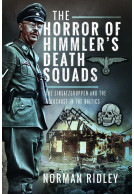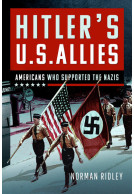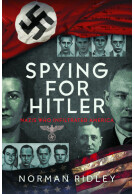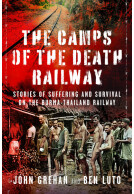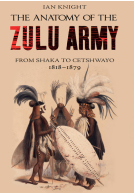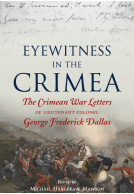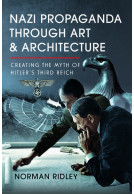Hitler and Poland (ePub)
How the Independence of one Country led the World to War in 1939

File Size: 15.7 MB (.epub)
Pages: 272
Illustrations: 16 mono illustrations
ISBN: 9781399043496
Published: 18th October 2023
| Other formats available - Buy the Hardback and get the eBook for £1.99! | Price |
|---|---|
| Hitler and Poland Hardback Add to Basket | £22.00 |
Following the end of the First World War, the newly reformed state of Poland was wedged uncomfortably between the two dominant nations of Germany and the Soviet Union. With their diametrically opposed political philosophies, both of Poland’s neighbours plotted continuously to reclaim its lands that had up until recently been part of the once great but now defunct German and Russian empires. In order to protect itself, Poland was obliged to plot and negotiate with both of its neighbours to try and prevent them from realising their ambitions to eviscerate the country.
The United States had been instrumental in the creation of the Polish state after the First World War, Wilson in particular stoking the Poles’ growing powerful nationalistic fervour. As Norman Ridley reveals, this was the beginning of a turbulent period for Poland. There was, for example, the dramatic and improbable ‘Miracle on the Vistula’ when Polish forces defeated the communist Red Army in 1920 – and in so doing halted the spread of communism across eastern Europe. As well as bitter ethnic battles between Germany and Poland for the political control of Upper Silesia, there were also the burning ambitions of Weimar Germany, and later Nazi Germany, to reclaim lands stripped from them and incorporated into the new state of Poland at Versailles.
Despite America’s initial support after the war, the US thereafter showed little interest in Poland’s predicament. While France was a traditional friend to the Polish peoples, and a significant supplier of military aid, its political influence over eastern European affairs weakened as its own political institutions fell prey to extremes of both left and right and its immediate post-war dominance waned. Britain was interested only in commerce and that made Germany and Russia significantly more important as trading partners than the predominantly agricultural and technically backward state of Poland.
Despite the dominance of right-wing politics in Poland, the emergence of Hitler and the Nazis in Germany did little to bring the countries together. This even drove them further apart as the Führer ramped up his rhetorical assault on the perceived injustices of Versailles, which were soon to translate into territorial expansion over Austria and Czechoslovakia. Poland was to be the next in line.
Britain and France belatedly roused themselves to challenge the threat posed by Hitler and the Nazis. After the capitulation of the Anschluss and the humiliation of Munich, London and Paris found themselves in the disagreeable position of seeing no option but to throw their whole weight behind the integrity of the Polish state if they were ever going to make any sort of stand against Nazi aggression.
As featured
The History Shelf BookTube channel
"In all, a useful book....Recommended."
Iron Cross - Issue 21
Rating: 5 out of 5 stars
NetGalley, Sylvia Gazdzinska
"Hitler and Poland" by Norman Ridley offers a detailed and insightful examination into the complex and tumultuous relationship between Adolf Hitler and Poland, setting the stage for one of the most devastating conflicts of the 20th century. Ridley meticulously navigates through the historical, political, and military intricacies that defined the prelude to World War II, providing a comprehensive analysis of the events leading up to the invasion of Poland in 1939.
Ridley's approach to this sensitive and weighty subject matter is both scholarly and accessible, making it a valuable read for historians and general readers alike. He delves deep into the ideological underpinnings of Hitler's policies towards Poland, exploring the broader context of German nationalism, territorial ambitions, and the quest for Lebensraum. Ridley doesn't shy away from the darker aspects of this history, including the tragic impact on the Polish population and the role these events played in the unfolding of the Holocaust.
What makes "Hitler and Poland" stand out is Ridley's ability to draw on a wide range of sources to paint a multifaceted picture of the period. He balances political analysis with personal stories, giving voice to the individuals who lived through these tumultuous times. This humanizes the narrative, providing a poignant reminder of the personal costs of political and military conflicts.
Ridley also offers critical insights into the international response to Hitler's aggression towards Poland, including the failures and miscalculations of European diplomacy. His critique of the appeasement strategy and the international community's inability to effectively challenge Nazi ambitions before it was too late serves as a sobering lesson on the importance of confronting aggression.
In conclusion, "Hitler and Poland" is a compelling, well-researched book that sheds light on a crucial chapter of European history. Norman Ridley succeeds in making a complex historical period understandable and engaging, offering readers a deeper understanding of the factors that led to World War II. Whether you're a student of history, a World War II enthusiast, or simply looking to understand more about this pivotal time, Ridley's book is an informative and thought-provoking read.
Rating: 5 out of 5 stars
NetGalley, Sandra Miller
A documentary account of the state of mainly Eastern Europe between the signing of the Treaty of Versailles in 1919 and the outbreak of WWll in September 1939. In those intervening 20 years, there was constant wrangling between many Nations over the redrawing of the European Borders in 1919. The ensuing displacement of national ethnic speakers caused even more friction as did the expansionist ambitions of the emerging Soviet Union. The rise of Adolf Hitler and the rapid expansion in the strength of the German Armed forces in defiance of the Treaty of Versailles, set the stage for the next major conflict in Europe.
This book opens our eyes today to be very wary of what aggressive nations say and do and to avoid sleepwalking into similar situations in the future. Some will say that the state of Europe today combined with other geographically adjacent tensions, should cause grave concerns for this and the next generations’ peaceful coexistence.
A required read for anyone who wants to learn the lessons of the past.
Review as featured in
Historical Miniatures Gaming Society, December 2023
If you would like to to know what happened without an involved discussion of why and without a deeper understanding of the cultural background then this book will fill a niche in outlining Poland’s international relationships between 1918 and 1939.
NetGalley, Ryszard Hermaszewski
A captivating exploration of a critical period in Poland's history.
Reader review
About Norman Ridley
NORMAN RIDLEY is an Open University Honours Graduate who writes about the less well covered aspects of 20th Century history. He lives in the Channel Islands.









